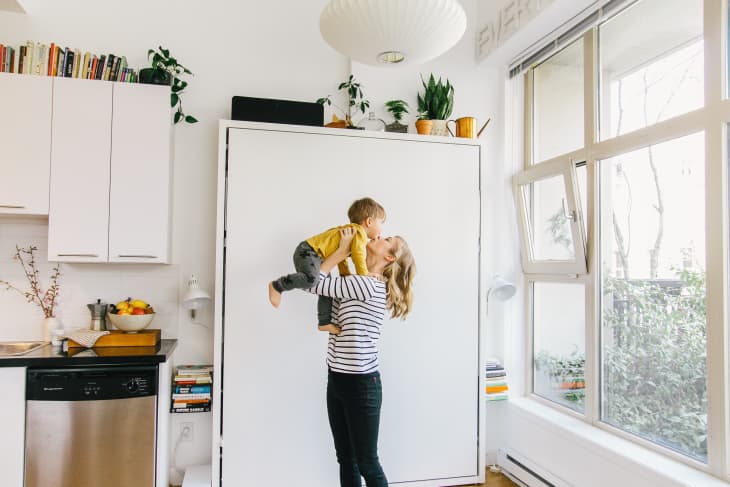There’s A Psychological Reason You Want to ‘Nest’

My house has never looked better than it did in the third trimester of my pregnancy. My kitchen cabinets and bedroom closet were organized, my carpets and counters were clean, and my living spaces were decked out with the latest mid-century pieces from Target and CB2. As I deep-cleaned and primped my home prior to the baby’s arrival, I knew exactly what was happening: I was nesting.
(And then the baby came, and all bets for a clean or well-designed home were off. But that’s a story for another article.)
What is Nesting Behavior?
The phenomenon of “nesting,” or obsessively housekeeping during the last weeks of pregnancy, is a commonly discussed topic for new parents. Animal-like in our housekeeping vigor and Joanna-Gaines-level in our Pinterest game, we instinctively want our living spaces to look and feel like home when our babies arrive.
Oddly, though, I’ve noticed myself doing the same thing during other times of transition in my life. Driven by an urge to create a home where I feel physically and emotionally safe, I tend to rearrange, overhaul, and organize my home during other periods of anxiety or stress, like when my son started daycare for the first time or when my bank account balance was hovering dangerously close to zero (wait, that might have been the same time).
Nesting is About Taking Control
While the caricature of a 38-week pregnant person scrubbing the bathroom tile on their hands and knees (or an anxious parent purging outgrown kids’ clothes) seems frivolous, there’s a psychological reason for our instinctive pull to nesting — and it has to do with control, or at least the illusion of it. According to an article in the journal Evolution and Human Behavior, anthropological data shows us that having control over one’s environment is a primary feature of preparing for childbirth. Becoming a parent is a time colored by unpredictability, and if we can take matters into our own hands—any matters at all—we might feel a little more at ease. A little more prepared for something we know we can’t possibly prepare enough for.
The same principle could hold true in other times we need a little extra help to find our footing. Sherrie Campbell, Ph.D, licensed psychologist and author of “Success Equations: A Path to Living an Emotionally Wealthy Life,” says she commonly sees redecorating take place after breakups or during rough patches in friendships, after the death of a loved one, or, more obviously, after a move. Redecorating a room (or all the rooms!) is a regular part of keeping a home, but when we’re in transition or in crisis mode, a rearranged space can feel like a rearranged life.
“Redecorating has the power to make us feel like we have literally created a new energy, a new vibe, a new life,” Dr. Campbell says. “Transitions in our environment can be good for the soul—they make us excited to come home and revel in our cozy, new space.”
And Maybe About Stress, Too
The nesting urge can also surface on a smaller, more practical scale. Have you ever noticed that, under stress, you all of a sudden want to clean your entire house? (That’s one upside of anxiety, I guess.) There’s scientific evidence of the correlation between stress and ritualization, or redundant, repetitive behaviors like washing dishes or scrubbing counters. One 2015 study in the journal Current Biology posits that rituals like cleaning and organizing might even be an effective coping mechanism for anxiety—and, fascinatingly, the study found people with higher anxiety levels made more rigid and repetitive hand movements, which scientists think is a coping strategy.
For some personality types and cultures, decluttering and redecorating are a more routine way of keeping a serene, livable environment—that’s the whole principle of Feng Shui, the Chinese practice of creating harmony between people and their living spaces. While there’s not really any empirical evidence that moving your bed to the other side of the room can enhance your well-being, practitioners (and abounding anecdotes) assert that abiding by spatial laws can create a more harmonious, happier environment and life.
So whether you’ve got a baby on the way, you’re feeling stressed, or you just want an excuse to invest in the entire Hearth & Hand line at Target, go ahead and indulge your nest. You deserve to feel at home in your house—and homekeeping is more of an art than a science, anyway.